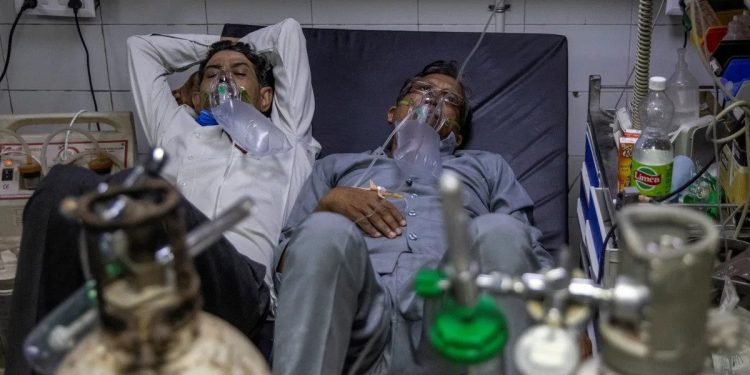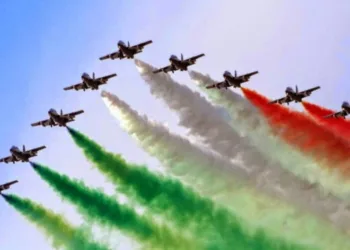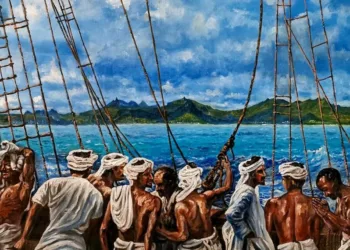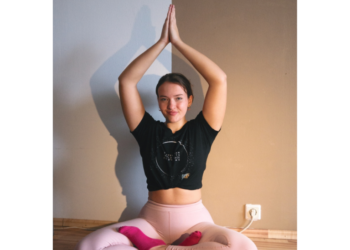It began as concern with one’s family in India, but soon expat Indians felt the need to bring aid to more people struggling to find oxygen cylinders and essential drugs.
By Priyanka Choudhury
Purnendu lives in the United States. His parents are in India. This expatriate Indian wanted to ensure that if and when COVID-19 struck home, his parents would not suffer for lack of medical treatment. That was the least he could do. And yet, when the pandemic’s second wave hit India, that looked like an insurmountable task.
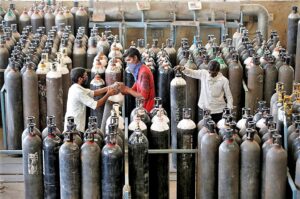
The medical system in India was creaking under the pressure of rising COVID-19 cases, with a lack of beds, oxygen concentrators and ventilators, sky-rocketing prices of oxygen cylinders, and a lucrative black market in medicines. Medical workers grew exhausted, and many succumbed to the virus. According to BBC.com, the weekly average of COVID-19 cases during the first wave was a little more than 60,000 in September 2020, while six months later in April 2021, the weekly average was around 130,000. Cases of breathlessness among patients were reportedly higher this time, according to the Director General of the Indian Council of Medical Research.
On 30 April, India exempted the import of oxygen concentrators from customs clearance. This sent a small wave of relief through Indian expats in Europe. It was incentive enough for many to ship home oxygen concentrators. Living in a faraway land, not knowing when a crisis would strike, they could at least arm their families with the medical necessities.
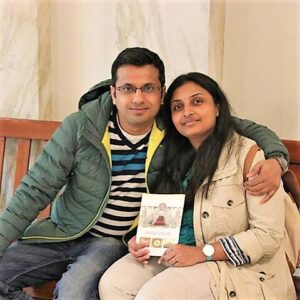
“What I have realised through this process is that people here are willing to donate but they are looking for trustworthy institutions and individuals with a track record of good work to entrust their money to. Unfortunately, most people refrained from donating to government relief funds citing lack of transparency and accountability.”
Arnab Ray, Raising funds for Sopan in UK
Bhawana Raaney, a researcher in Germany, has ageing parents and an asthmatic sister and niece at home in Delhi. When she tried to send an oxygen concentrator to her parents in Delhi, she realised the process was challenging and decided to note down the details for her fellow expats in Europe who were trying to send oxygen concentrators to their families in India. She circulated the information in her social media groups.
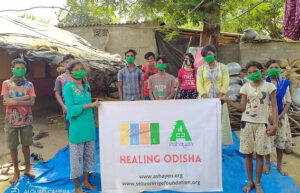
By this time, expat communities had been galvanised into action. Individuals, NGOs and corporates started pouring in help. Social media pages, handles and communities were alive with expats reaching out and trying to help by sharing information and offering services and funds. People lost little time organising themselves. Much of this groundwork had already been done when a different disaster struck last year. Besides the trail of misery left behind by India’s first COVID-19 wave and national lockdown, many lives and homes were lost to the cyclonic storm Amphan in West Bengal, Orissa, and the Andaman Islands. Observers are still arguing whether more deaths were caused by the disease or by the starvation induced by the lockdown. In their article in Sensors International, Aritra Ghosh, Srijita Nundy and Tapas K. Mallick commented that disease and starvation both concomitantly influenced the death of Indians.
The tragedy last year saw NRIs raise funds through crowdsourcing websites and partner with local NGOs to send food and necessities to cyclone-hit areas. The overarching goal at the time was to ensure that affected people had access to the bare minimum necessities of food, shelter and medicine.
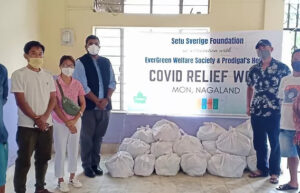
Arnab Roy is a software professional from Kolkata who is now settled in Leeds in the UK. He is a member of the core team of Sopan (www.facebook.com/sopankol), an NGO started by alumni of Kolkata’s Jadavpur University, who had come together early last year to build a school for all-round development of underprivileged children. Soon, however, they found themselves taking on COVID-19 and Amphan relief activities, on a large scale.
Roy recalls that “Initially, we made individual contributions towards pandemic relief and did not raise any funds. But in the course of our work, when we witnessed the scale of the havoc wrought by Amphan, we realised that individual donations were too minuscule to rebuild our state [West Bengal[. That’s when I started coordinating with the Indian diaspora here in Leeds. I started sharing Sopan’s appeal for Amphan to my network here, to various WhatsApp groups as well as personal contacts. Many donated straight through the Ketto.org fundraiser link provided in the appeal, and many transferred the amount through me.”
Roy says that there were other groups in Leeds, too, who were raising funds similarly.
“What I have realised through this process is that people here are willing to donate but they look for trustworthy institutions and individuals with a track record of good work to entrust their money to. Unfortunately, most people refrained from donating to government relief funds citing lack of transparency and accountability,” he says.
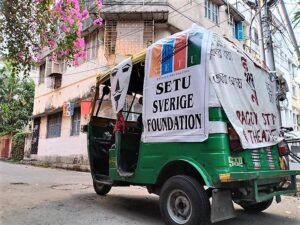
Roy recalls how the UK government has taken responsibility for the welfare of those laid off during the lockdown. It launched a furlough scheme whereby the government pays 80 percent of a worker’s salary (up to a maximum of £2,500) to individuals laid off during the lockdown, thereby easing the burden on the employer as well. Lockdown in the UK was implemented in a phased manner, giving people enough time to return to their homes.
With regard to accountability, Sopan recently shared bills of purchase of medical equipment with donor money on its Facebook page. Collaborating with other NGOs and charities is essential if far-flung areas in need of aid are to be reached. Sopan has collaborated with Biloopto, the Swami Vivekananda Scouts Group and Manobik Ranaghat for a concerted effort to help those affected by the second wave of the pandemic.
In Canada, many Indians organised themselves into fundraising groups to help the victims of the second wave in India. Ilona Maitra was part of several such fund-raising groups, raising awareness and sending out donation requests to her friends and followers on social media. She even started a crowdfunding campaign on the fund-raising platform GoFundMe.
“There are several organisations out there that are way more professional than us and are raising funds on a large scale,” she says. “Ours was a matter of the heart. A close friend saw his best friend’s wife succumb to COVID-19 and approached me to start our own funding campaign.” Maitra and her team reached out to Literacy India for distributing food, pulse oximeters and medical necessities.
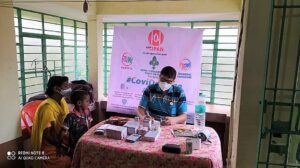
In Sweden, the SETU Sverige Foundation (www.setusverigefoundation.org) was set up by Ayon Chakraborty and a group of six like-minded people, all of whom firmly believed in the wonders that a united effort could do for any good cause.
“The core team is extremely respected among the Indian diaspora in Europe,” says Chakraborty. “SETU Sverige Foundation has always received the trust and support of its donors. Our donors, who bet on our transparency and the volume and range of our work, are from Europe, the UK and the Middle East. A considerable proportion of our donors are of Indian origin. However, a helping attitude need not be bound by nationality. We have local European contributors who have helped us immensely in our work.”
About how and to whom the Indian diaspora wishes to contribute, Chakraborty echoes Roy’s thoughts when he says that there is no lack of generous people who want to pay it back to their motherland. But they want to be sure their funds are channelled effectively; they want to see the ground-level impact. “We meticulously document our activities on the ground for our donors.”

SETU is careful in its selection of partner NGOs in India. They look at NGOs that are registered to receive foreign contributions under the Foreign Contribution (Regulation) Act and that are working in high-impact areas on the ground. For example, BTS in the Sunderbans, Pratyek in Delhi, and Aashayein from Orissa are some of their partners in India. Ground partners like Kadu Malleshwara from Bengaluru, Aspire and Glee in Kolkata, Unique Blood Motivators in Mumbai, Karuna Foundation in Delhi, and Vishwadeep Trust in Ladakh have worked hand-in-hand with SETU over the years.
SETU worked with government departments and student union bodies as well, distributing funds and relief to those stricken by the coronavirus.
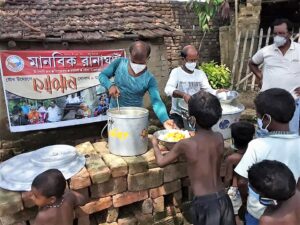
Chakraborty says there’s a difference in the direction of relief work during the first and second waves of COVID-19. SETU worked for the stricken immigrant workers as well as frontline workers in the police force and hospitals, during the first wave. During the second wave, however, their focus was on procuring oxygen concentrators and cylinders for hospitals with acute shortage. Till now, SETU has helped hospitals in Delhi, Bengaluru and Kolkata. In Orissa, SETU set up a month-long camp to build COVID-19 awareness.
While a number of Indians abroad have been active in fundraising, teams of medical professionals have come forward to lend a helping hand to their fellow medical professionals in India.

EGlobalDoctors, a community of non-residential Indian doctors, in collaboration with IT professionals from all over the world, has offered free online COVID-19 consultation to those suffering from the disease in India. EGlobalDoctors leverages mobile app- and web-based technology to reach as many people as possible, particularly if they live far from major cities or otherwise lack proper access to medical care.
Acutely aware of how the medical system in India was staggering under the weight of the crisis, eGlobalDoctors, in association with AAPI and SEWA International, began to provide free COVID-19 counselling to Indian patients. The process was simple. Patients filled out a form, after which they clicked on a zoom link to join a meeting for free medical counselling.
In just two weeks, the site experienced 165,000 visits from all over the world, out of which an astonishing 108,000 were from India.
(The author works in the field of content creation, adult training, and training to high impact groups.)


